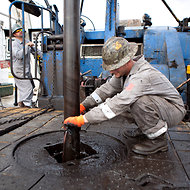 Michael Stravato for The New York TimesA site where Chesapeake Energy is drilling near Big Wells, Tex.
Michael Stravato for The New York TimesA site where Chesapeake Energy is drilling near Big Wells, Tex.
Deal-making in the shale gas sector, one of the hottest last year, is off to a strong start in 2012, with two foreign companies buying big stakes in operations in the United States.
The French oil giant Total announced plans on Monday to buy a piece of the Chesapeake Energy Corporation’s shale operation in Ohio for $2.32 billion. Hours later on Tuesday, Sinopec International Petroleum Exploration and Production agreed to buy a 30 percent stake in five Devon Energy shale operations for about $2.2 billion.
Under the terms of Chesapeake joint venture, Total will take a 25 percent interest in a 619,000-acre parcel of the Utica Shale in eastern Ohio. The deal is Total’s second partnership with Chesapeake, the most active natural gas driller in the United States.
Chesapeake could use the cash to reduce long-term debt. The company has promised to reduce its debt by as much as 25 percent.
“We believe that the Utica Shale is a world-class asset with world-class returns, and now we have a world-class partner to help develop the play more aggressively than we could have with our own resources,” Aubrey K. McClendon, Chesapeake’s chief executive, said in a statement.
Chesapeake has sold stakes in a number of assets in recent years as it has sought to raise cash for development, and the company has promised billions more in asset sales and joint ventures this year. In 2011, Chesapeake sold shale assets in northern Arkansas to BHP Billiton for $4.75 billion.
Sinopec will pay Devon $900 million in cash and up to $1.2 billion in future drilling costs in exchange for a one-third interest in five shale operations, including in the Utica Shale, as well as for petroleum deposits in Louisiana, Oklahoma, Michigan, Colorado and Wyoming. Through the end of the year, Devon said it expected to drill 125 wells in the five locations.
“This arrangement improves Devon’s capital efficiency by recovering our land and drilling costs to date and by significantly reducing our future capital commitments,” John Richels, Devon’s president and chief executive, said in a statement.
Shale formations — sedimentary rock from which hard-to-recover natural gas and oil can be extracted using the drilling technique known as hydraulic fracturing, or fracking — have been active deal-making targets. But fracking has come under fire from environmental advocates and politicians, who have raised concerns about the safety of the drilling method.
Kohlberg Kravis Roberts sold assets in the Eagle Ford Shale formation to Marathon Oil for $3.5 billion in June, while that same month Progress Energy Resources sold a stake of similar size in its British Columbia venture to Petronas of Malaysia for about $1.1. billion. In March, Sasol bought a 50 percent stake in shale assets owned by Talisman Energy.
Chesapeake was advised by Jefferies Company on the transaction.
Article source: http://feeds.nytimes.com/click.phdo?i=b0c52a4160ddff093c658ca14aff7309
Speak Your Mind
You must be logged in to post a comment.